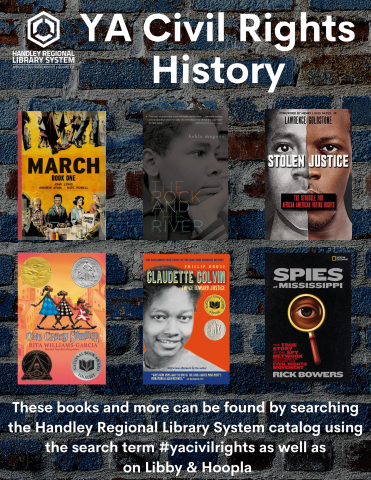
Our teen book spotlight this week is focused on books that explore aspects of Civil Rights history. Books are amazing tools to learn from as we explore parts of our past; they provide an opportunity to learn, explore, understand other points of view, and help us to understand and glean from the past. As we remember Martin Luther King Jr. day (happening on January 18th), we need to also remember everything about this movement--the good, the bad, the individuals and what they sacrificed, and where we are today. We have a selection of fiction and nonfiction, some about events and people you may have heard of before and then others you may have not but are so important to our history that their story needs to be shared. These books and more can be found by searching the catalog using the search tag #yacivilrights as well as on Libby and Hoopla. Check back next week for a new teen book spotlight and if you have any book suggestions, please let us know!!
March, Book One by John Lewis--Using a graphic novel format featuring illustrations by Nate Powell, author Lewis presents a stunning, engaging autobiography that details key moments in his long, busy life. The first of a trilogy, this title chronicles the era from Lewis' childhood through his involvement in the civil rights movement, spotlighting the major developments, motivations, and influences that shaped him into the man he is today. The book reads as a work of historical nonfiction, and Lewis' direct involvement in the events of the era provides a firsthand perspective on the beginnings of the movement and the all-important March on Washington.
One Crazy Summer by Rita Williams-Garcia--In the summer of 1968, 11-year-old Delphine and her two younger sisters travel from Brooklyn to Oakland, California, to spend a month with the mother they barely know. Much to their surprise, they arrive to a cold welcome and discover that their mother, a dedicated poet and printer, is resentful of the intrusion of their visit and wants them to attend a nearby Black Panther summer camp. Left without an option, Delphine attempts to make the best of things while attending the day camp but remains skeptical of the hateful words spouted by the camp instructors.
The Rock and the River by Kekla Magoon--Thirteen-year-old Sam Childs is caught in a character struggle when his nonviolent father, who has worked tirelessly for equal rights, is stabbed and his hero, Martin Luther King, is assassinated. His older brother secretly joins the Black Panthers, and Sam is tormented by all his father has taught him and the reality of a young black man's life in 1968 Chicago. As tumultuous violence unfolds around him, Sam is forced to take a stand that will change his life.
Claudette Colvin: Twice Towards Justice by Phillip Hoose--15-year-old African American Claudette Colvin, who was arrested for refusing to give up her seat on a Montgomery bus almost a year before Rosa Parks, committed the same act of civil disobedience. Because she was considered too emotional to be the "face" of the bus boycott, the importance of Colvin's actions was lost. However, she later testified in a federal lawsuit that helped end discrimination on public transportation.
Stolen Justice by Lawrence Goldstone--Investigates the history of the Reconstruction era following the Civil War and the efforts to secure newly freed slaves and later generations of African Americans the right to vote. Explores the partisan fighting over the Constitution and legislature--with Constitutional Amendments, Reconstruction Acts, Civil Rights Acts, and Enforcement Acts being needed--to finally secure the vote for black Americans.
Spies of Mississippi by Rick Bowers--Offering a new take on an oft-overlooked and rarely discussed issue from the Civil Rights era, Bowers explores the history and actions of the Mississippi State Sovereignty Commission, a state-sponsored agency created for the sole purpose of disrupting integration efforts. Bowers details the Commission's formation and tactics, which ranged from spreading propaganda to using Soviet-style spying methods, and outlines the lengths to which the group went to continue its cause.